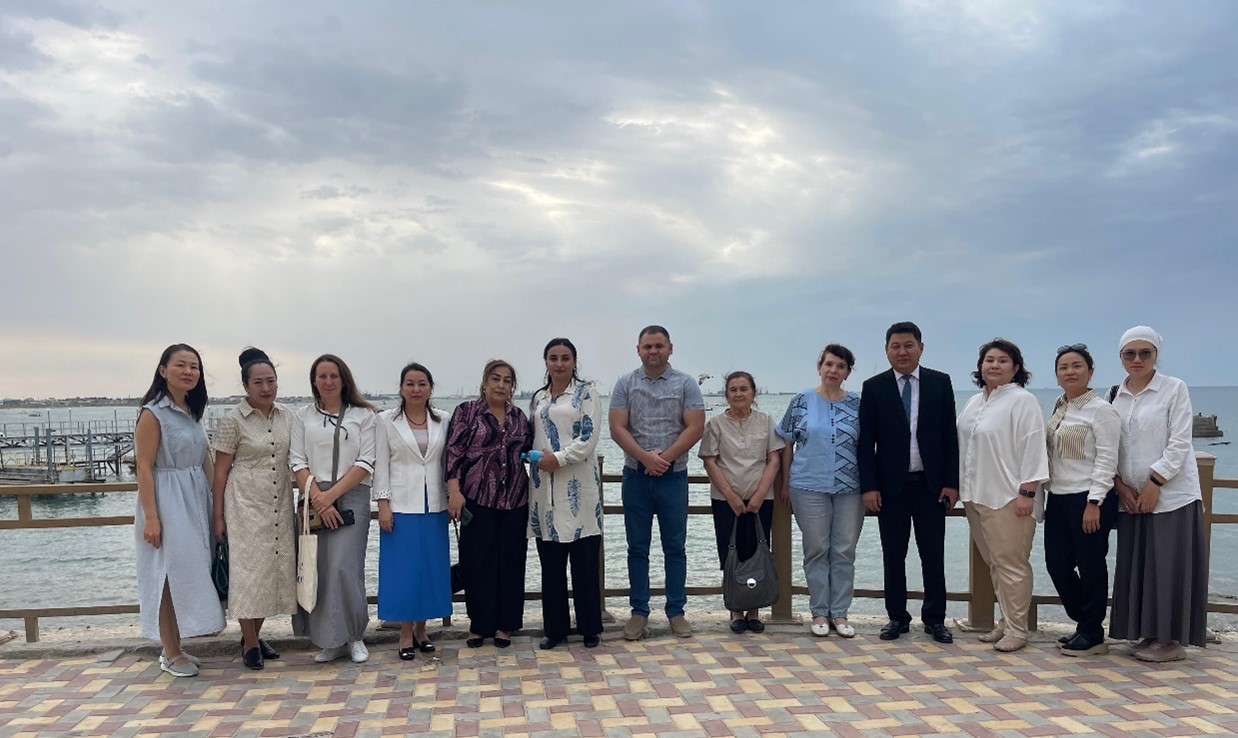
On August 26, 2024, an exchange visit of water quality laboratories took place in the city of Aktau, Republic of Kazakhstan, organized within the framework of the Action Plan of the Regional Working Group on Water Quality (RWG-WQ). The need for conducting the exchange visit was identified during the sixth meeting of the RWG-WQ, which was held in December last year in Astana.
The event was organized with the support of the Ministry of Ecology and Natural Resources of the Republic of Kazakhstan (MENR RK) and the Regional Environmental Centre for Central Asia (CAREC).
Twelve representatives from the hydrometeorological services of Kazakhstan, Kyrgyzstan, Tajikistan, and Uzbekistan met with leading Kazakhstani laboratories specializing in monitoring the water quality of the Caspian Sea to exchange experiences.
The participants visited the testing laboratory of LLP 'Kazakhstan Agency for Applied Ecology' (KAPE) and the hydrobiological laboratory of LLP 'Nomad ECO'.
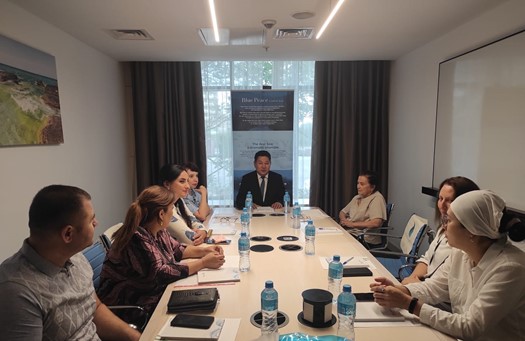
At the beginning of the meeting, participants exchanged welcoming remarks.
Armat Dzhusupkaliev, Head of the Department of Ecology of the Mangystau Region, expressed gratitude to the Blue Peace project for providing the opportunity to meet and exchange experience with colleagues from countries geographically distant from Western Kazakhstan.
He also emphasized that the Caspian Sea could share the fate of the Aral Sea if joint measures are not taken to preserve biodiversity and protect the water body from pollution and shallowing.
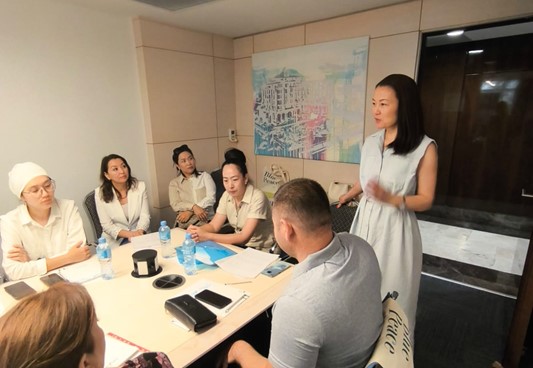
Irina Yugay, a CAREC specialist and representative of the Blue Peace project, noted that 'expanding the geographic scope of the RWG's work will allow its members to gain unique insights from leading surface water quality laboratories in Kazakhstan. In the second phase of the Blue Peace project, which is set to begin in mid-2025, further support for the RWG-WQ's activities and enhanced cooperation among countries through joint water monitoring and exchange visits, with the involvement of upstream countries — Kyrgyzstan and Tajikistan — will be a priority of the project.
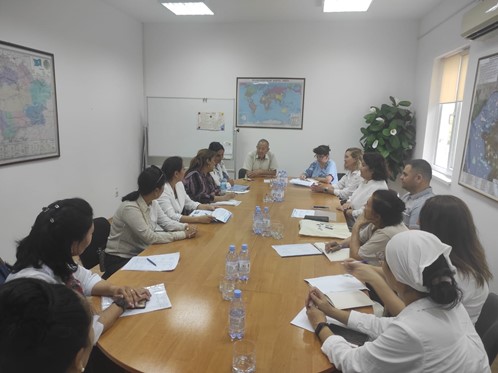
The meeting participants familiarized themselves with the equipment and methodologies of the Chemical-Analytical Center of the Testing Laboratory of LLP 'KAPE'. They exchanged information on the applied methods and the quality parameters determined for natural and wastewater, air, and soil, which are used for a comprehensive assessment of pollution levels.
Currently, KAPE carries out various types of environmental monitoring both on land and at sea, including baseline monitoring studies and industrial environmental monitoring. The laboratory is accredited and comprises a hydrobiological testing laboratory, a chemical-analytical laboratory, and a mobile environmental laboratory.
KAPE’s main clients include major industrial companies such as Agip KCO, Tengizchevroil, Karachaganak Petroleum Operating, as well as government bodies of the Republic of Kazakhstan, including the Fisheries Committee and the Department of Natural Resources and Environmental Regulation, among others.
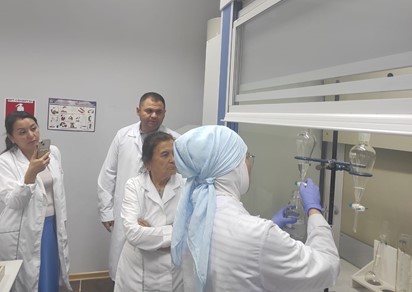
KAPE staff willingly shared information about the research they conduct, which provides data on the hydrological regime of water bodies, including the Caspian Sea, essential for assessing the condition of aquatic ecosystems, forecasting possible changes, and developing regulatory measures.
Equipped with research vessels, LLP 'KAPE' carries out joint studies on the Caspian seal population together with Russian research institutes. The laboratory uses modern equipment to perform detailed analyses of the chemical composition of water and bottom sediments. For example, atomic absorption spectrometry (AAS) allows the detection of 74 toxic elements, including heavy metals, in both liquid and solid samples. At the same time, simpler so-called classical methods are also used, such as the pipette method for analyzing the granulometric composition of bottom sediments.
'We cannot know everything, so it is never too late to learn from each other. I believe this was a successful exchange of experience. Upon my return, I will certainly inform my colleagues in the soil laboratory about which methods need to be improved and additionally utilized. If necessary, we will send them here for training,' shared Madalieva Saliya, Head of the Department for Analytical Water Quality Control in the Field of Environmental Protection of Uzbekistan.
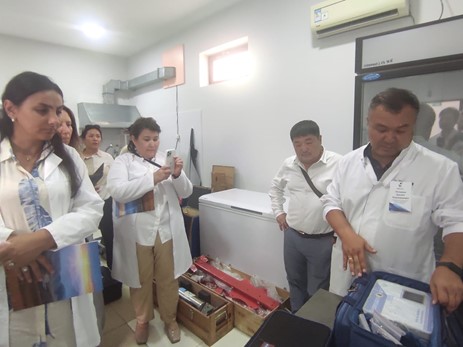
In the afternoon, a visit to the hydrobiological laboratory of LLP 'Nomad ECO' took place.
The laboratory staff demonstrated modern equipment used for analyzing hydro-physical and hydro-chemical parameters of seawater, the microbiological composition of bottom sediments, as well as for ichthyological and hydrobiological studies.
The participants had the opportunity to examine marine phytoplankton and zooplankton under microscopes and to perform rapid analyses of benthos — the community of plant and animal organisms living in the seabed — endemic to the Caspian Sea.
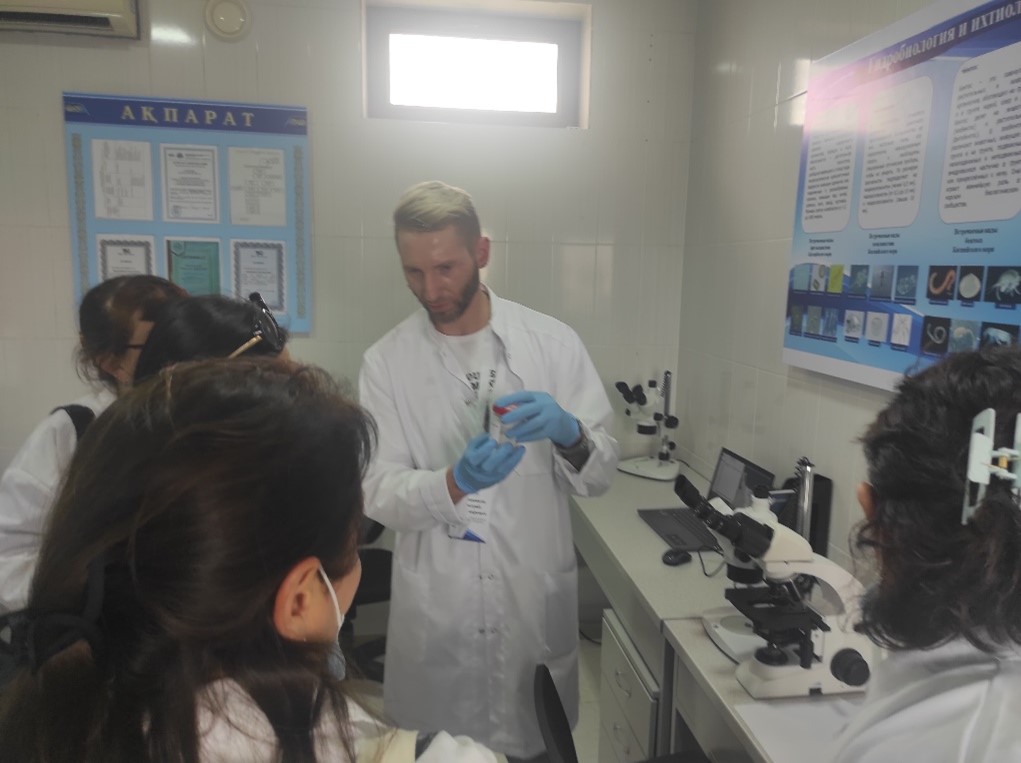
After the demonstration of the analyses, a discussion took place regarding the causes of the changing water levels in the Caspian Sea.
The laboratory staff attributed the shallowing of the Caspian to climatic, geological, and anthropogenic factors.
'The sea's lack of connection with the ocean leads to constant fluctuations in its level. Over the past three years, the sea level has dropped by 1.5 meters. In recent years, we have observed record-high rates of water evaporation, as the region experiences extremely hot and dry weather during the summer,' the laboratory representatives explained.
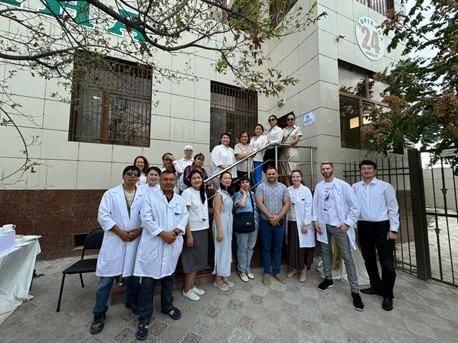
Anna Sabirbayeva, General Director of LLP Nomad ECO, noted that the lack of data exchange regarding the state of the environment and seawater among coastal countries is a major reason for the ongoing deterioration of the Caspian Sea's condition.
She expressed concern about the weak cooperation between countries in sharing results regarding measures taken to address identified sources of pollution, as well as the absence of joint mechanisms for counteraction, suppression, and prevention of violations related to pollution from oil extraction companies, since not all Caspian countries strictly control discharges from marine oil tankers.
Overall, meeting participants repeatedly drew parallels between the Caspian and the Aral Sea, emphasizing the importance of establishing ongoing connections among all countries sharing a common water body.
Such interaction is facilitated through platforms like the RWG-WQ, which provide space for technical dialogue between countries on water quality issues, helping to develop joint measures for the conservation of aquatic ecosystems for future generations.
Detailed information:
Tais Reznikova, Program Manager of CAREC's «Water Initiatives program», treznikova@carececo.org
The Regional Working Group on Water Quality (RWG-WQ) was established in 2009 at the initiative of the UNECE and CAREC.
The group includes representatives of national ministries and agencies responsible for hydrometeorological and sanitary-epidemiological supervision, as well as water resources management and environmental protection in the countries of the region.
Since 2019, the activities of the RWG-WQ have been supported by the 'Blue Peace Central Asia' initiative of the Swiss Agency for Development and Cooperation.
Thanks to this support, the RWG-WQ has developed into an expert platform that provides opportunities for active technical dialogue and open discussions on water quality issues at the transboundary level.
Regular meetings are held 1–2 times a year.
 On August 26, 2024, an exchange visit of water quality laboratories took place in the city of Aktau, Republic of Kazakhstan, organized within the framework of the Action Plan of the Regional Working Group on Water Quality (RWG-WQ). The need for conducting the exchange visit was identified during the sixth meeting of the RWG-WQ, which was held in December last year in Astana.
On August 26, 2024, an exchange visit of water quality laboratories took place in the city of Aktau, Republic of Kazakhstan, organized within the framework of the Action Plan of the Regional Working Group on Water Quality (RWG-WQ). The need for conducting the exchange visit was identified during the sixth meeting of the RWG-WQ, which was held in December last year in Astana.





